Currently, WhatsApp is the largest messaging service in the world with over 2 billion monthly active users. Following that, Telegram accounts for 400 million and Signal stands at a ballpark of 10-20 million monthly active users. Looking at the raw numbers, it’s clear that WhatsApp is wildly popular and almost ubiquitous while Telegram is catching up and Signal seems to have just joined the million downloads race. Having said that, numbers don’t tell you everything and that’s why we bring you a detailed comparison between WhatsApp vs Telegram vs Signal.
In this article, we rigorously analyze the security models of all three messaging services and also look at their distinct features. Now with all that said, let’s go through the article and find out who wins this battle.
WhatsApp vs Telegram vs Signal: A Rundown (2022)
We will be comparing these three instant messengers on a number of fronts: security, features, and ownership. We will discuss all the things you get and lose by choosing one of these messengers over the others, so you can make a well educated choice about which app you want to use.
As always, you can use the table of contents to skip ahead to any section you’d like to read about.
1. Security
Before anything, I would like to begin with security first as it’s the most debatable and contentious topic among the three messaging services. So let’s start off with WhatsApp’s security model first in this battle against Telegram and Signal.
One thing that WhatsApp definitely has going for it is its end-to-end encryption. Plus, E2E on WhatsApp is available on every single mode of communication that the app enables. So all your messages, video calls, voice calls, photos, and anything else you share is end-to-end encrypted on WhatsApp.
What that means, is that you and the recipient are the only people who can read the messages you send to them. WhatsApp can’t decrypt the contents of your messages, calls, photos, etc, thus ensuring your security and privacy.
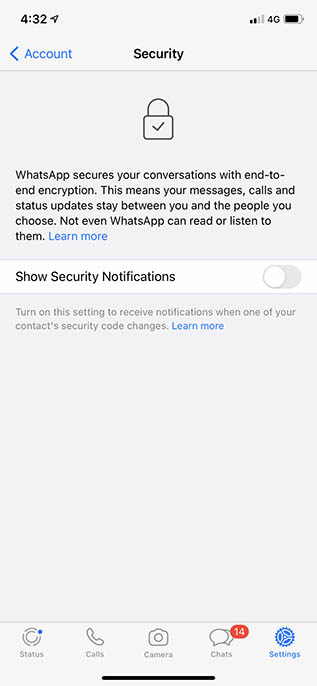
That said, it’s noteworthy that WhatsApp uses the E2E protocol developed by Open Whisper Systems, which is the name behind Signal messenger. That’s a good thing, because the Signal protocol is open source, widely peer-reviewed, and is generally considered one of the best protocols for implementing end-to-end encryption in messaging platforms.
It’s also noteworthy that even though all your communication on WhatsApp uses E2E encryption, the company does not encrypt backups (cloud and local). Also, it does not encrypt the metadata which is used to carry communication between two endpoints. This is one of the major criticisms of WhatsApp’s security model. While metadata does not allow anyone to read your messages, it lets authorities know whom and when you messaged someone, and for how long.
But that’s on the back-end. What about security features on the user-facing side of WhatsApp. Well, WhatsApp offers a built-in app lock feature on both the Android and iOS apps, so you can lock your WhatsApp chats with biometrics. Moreover, you get support for two factor authentication (2FA) on the app, which is great for security as well.
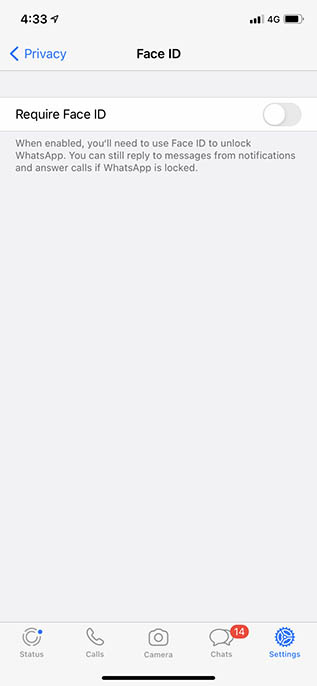
Overall, WhatsApp does a pretty solid job of ensuring security for its users. That said, WhatsApp has suffered a couple of major privacy nightmares, especially the recent issue with group chats getting indexed on Google search. That issue has been fixed, however, it was not a good look for the messaging app.
Telegram
As far as security is concerned, Telegram does offer some protections to its users. However, there are multiple pain points in the way Telegram encrypts your messages and other information. For one, while Telegram supports E2E encryption, it’s not enabled by default. The only way to use E2E encryption on Telegram is to use its secret chats feature.
Messages sent in a secret chat are E2E encrypted, which is nice, but regular chats are not. This means means that the messages are encrypted on your device and then they are decrypted on Telegram’s server. Again, the messages are encrypted on the server and sent to the recipient’s device for final decryption. As you can see, in this process, Telegram has the encryption keys on the server-side and can, in theory, access your normal chats.
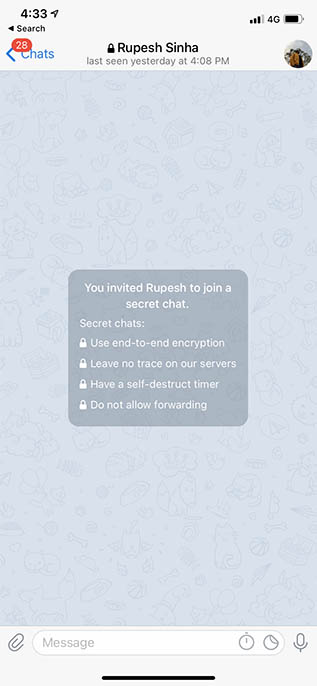
For what it’s worth, Telegram states that it manages its message storage and decryption keys in a way that one would require court orders from multiple legal systems around the world to be able to access any of your data. In fact, the company says that it has shared 0 bytes of data with third-parties and governments to this date.
Even if you’re using secret chats, Telegram uses its own proprietary encryption protocol, MTProto, to encrypt your messages. This may very well be fine, but since its a closed-source protocol, security researchers can’t verify it. As such, security researchers believe that using an open-source and widely trusted protocol such as the Signal protocol would have been better than using a proprietary closed-source encryption protocol in Telegram.
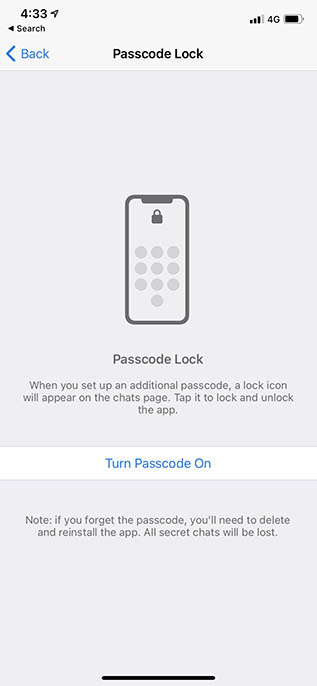
On the user-facing side of things, Telegram, like WhatsApp, also offers a built in app lock. However, end-to-end encryption is incredibly scarce in the app. Telegram groups are not encrypted because Secret Chats are only supported for single-user communication. Moreover, Telegram’s desktop client doesn’t support E2E encryption on any platform other than macOS.
Clearly, Telegram’s security isn’t nearly as robust as WhatsApp’s or Signal Messenger’s.
Signal
Signal is by far the best when it comes to security, be it on the back-end or on the user-facing side of the service.
As mentioned above, Signal uses the open-source Signal Protocol to implement end-to-end encryption. And just like WhatsApp, the E2E encryption covers all forms of communication on Signal.
While WhatsApp encrypts messages and calls (and that’s enough for most users), Signal goes one step further and encrypts the metadata too. In order to protect user privacy from all corners, Signal devised a new way to communicate between the sender and the recipient and it’s called Sealed Sender. Basically, with Sealed Sender, no one will be able to know — not even Signal — who is messaging whom, which is amazing.
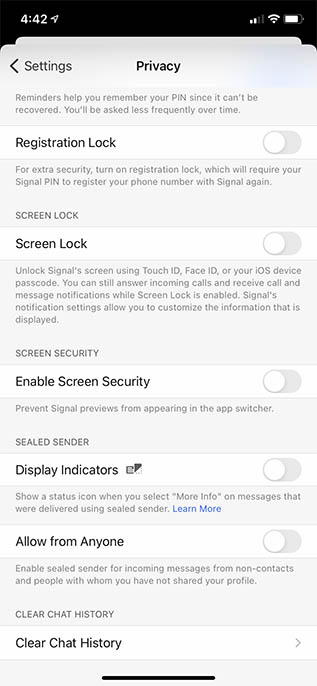
In addition, you have some incredible privacy features on Signal that is going to make your messaging experience even more private and secure. For instance, you can lock Signal with a passcode or biometrics. Then there is 2FA and an option to block screenshots within the app and the recent screen. And recently Signal added a new feature to blur faces automatically before sending images. That’s cool, right?
Not to mention, Signal by default encrypts all the local files with a 4-digit passphrase. And if you want to create an encrypted local backup then you can do that as well. The app now also supports encrypted group calls.
There was recently some reporting about Cellebrite cracking Signal’s security. However, Signal has since debunked that news and you can read more about it here. All in all, in terms of security and privacy protection, Signal stands head and shoulder above WhatsApp and Telegram and that make it the most secure messaging app between the three.
2. Features
Moving on, let’s take a look at the features offered by these three apps and see which one offers the most to its users.
For the most part, WhatsApp offers almost every feature you might need. You get support for group chats with up to 256 members. You can also broadcast messages to multiple contacts at the same time.
There’s also support for voice and video calls, both for individual users and groups. However, for group video calls, you are restricted to 8 users at any time.
Apart from that, WhatsApp offers a distinct feature that neither Telegram offers nor Signal. Yes, I am talking WhatsApp Status (also called Stories). Users love this feature as they are able to express their thoughts and feelings to their closed ones. In a way, this makes WhatsApp a social media platform, and not just a messaging service.
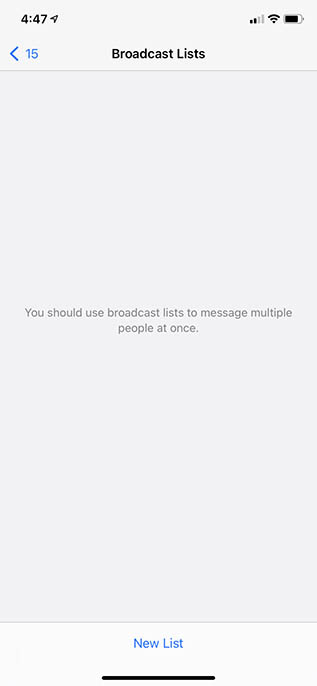
Moving ahead, you can share all sorts of files on WhatsApp, but there are file size limits to adhere to. For photos, videos, and audio files, the limit is 16 MB. However, documents can be up to 100 MB. You can also share live location with your contacts and I am sure many users find this feature helpful.
And since WhatsApp is meant for general users, it offers seamless backup and restore functionality through cloud services like Google Drive and iCloud. And the best part is that cloud backup is completely free. Not to mention, WhatsApp now also supports dark mode. To learn more about its features, you can head over to our article on the best WhatsApp tips and tricks.
Telegram
While WhatsApp offers most of the features you’d need, Telegram is basically overloaded with features. The app offers so many features that it’s incredible. Similar to WhatsApp, you get the basics such as chats, group chats and channels. However, unlike WhatsApp’s 256 member limit, Telegram brings support for groups with up to 200,000 members!
It also offers multiple group-specific features such as bots, polls, quizzes, hashtags and a lot more which can make group experiences a lot more fun.
The app also offers unique features such as a self-destructing messages feature which is great if you’re sending messages that you don’t want to remain on the recipient’s device for eternity. You also get support for editing sent messages, along with features like message scheduling, sharing uncompressed media, themes, and a lot more.
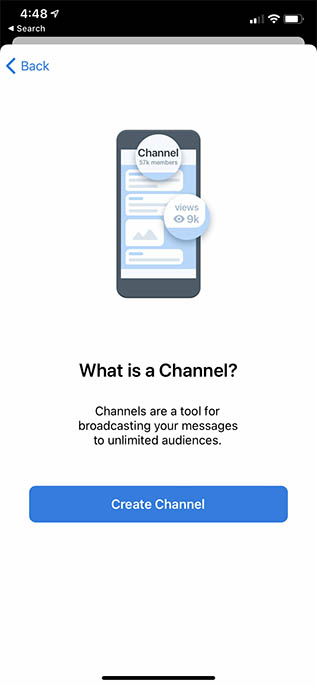
Telegram also offers incredible granular support over notifications you receive from the app. Plus, the size limit for sharing files on Telegram is a whopping 1.5 GB.
Up until a while ago, Telegram didn’t offer video calls. However, the app now supports both voice and video calls on Android and iOS devices, which is great because video call support was a big omission from the app.
Signal
While Signal beats Telegram and WhatsApp handily when it comes to security, it falls short on the features it offers. Still, I don’t think there’s any big missing feature that might deter you from using the app.
You have secure messaging, voice, and video calls and all communications are end-to-end encrypted. Further, you can create groups, however, you don’t have the option to broadcast messages to multiple contacts at once. Plus, Signal has recently added support for group calling as well, something that was missing from the app for a long time.
You have features such as disappearing messages similar to self-destructing messages of Telegram, and the ability to send a one-time viewable image. For me, the best feature of Signal is “Note to Self”. Unlike WhatsApp, you don’t have to create a single-member group to send notes to yourself. On Signal, the feature is available natively and you can jot down your thoughts and ideas while messaging with your friends and family.
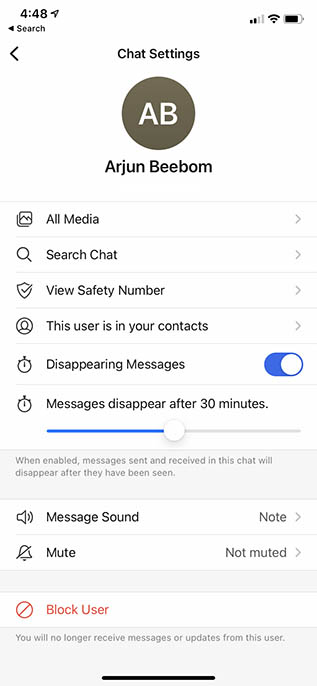
Apart from that, Signal allows you to relay voice calls to its servers so your identity remains concealed from your contacts. The feature is somewhat similar to what a VPN does. Signal also offers a built-in option to hide your IP address. Further, you can enable incognito keyboard while typing on Signal, apply dark mode, delete old messages in one stroke, and of course, blur faces and private information from images using its powerful photo editor.
There are also emojis and some privacy stickers, but they are very limited in comparison to WhatsApp and Telegram. All in all, Signal has some of the best privacy features but might fall short for users who want endless customization options. You can learn more about Signal features from our article on the best Signal tips and tricks.
3. Ownership
While that was all about security and features, now we need to discuss the ownership of all three platforms: WhatsApp, Telegram, and Signal. Ownership is important because it allows us to understand how companies are looking to monetize user data and lets you take an informed decision.
WhatsApp is owned by Facebook, and while for quite some time the company had managed to keep WhatsApp at least a little bit less intrusive into your personal life as compared to its eponymous social media platform, that’s changing now.
WhatsApp has a new privacy policy now and it is scary. Basically, the app will now share data with facebook family of apps for better ad targetting. You can read all about it in our article on WhatsApp’s new privacy policy.
That’s not all, throughout WhatsApp’s lifetime under Facebook, there have been multiple allegations around the company breaking encryption and creating backdoors for government agencies.
There are also reports about ads on WhatsApp becoming a reality sooner rather than later. That gives Facebook even more incentive to monetize your WhatsApp data. Plus, since WhatsApp doesn’t encrypt metadata, Facebook can readily use that to track your behavior.
Alas, this is Facebook we are talking about, and I don’t think I need to point out the sheer incompetency (or unwillingness) of Facebook to protect user data or give any sort of privacy protections. That’s something we have witnessed in a lot of detail since the Cambridge Analytica scandal.
Telegram
Coming to Telegram, it was launched in 2013 by Nikolai Durov and his younger brother, Pavel Durov. Both are from Russia and are currently on a self-imposed exile. Pavel Durov was dismissed as CEO of a Russian social-media site after he refused to hand over data of Ukrainian protesters to Russia’s security agencies.

Apart from that, on many occasions, Pavel Durov has taken a principled position against censorship and government interference. Looking at the history that geared the development of Telegram, I would say, it does inspire trust. However, the closed-source encryption protocol and optional E2E support leave the room for more transparency and improvement.
Signal
Finally, Signal is owned by the nonprofit Signal Foundation which is run by cryptographer Moxie Marlinspike and Brian Acton. Moxie Marlinspike used to run Open Whisper Systems — the brainchild behind the Signal protocol. After he met Brian Acton in 2018, they formed a new alliance called Signal Foundation. It now wholly funds the development of Signal messenger. It’s noteworthy that Brian Acton was the co-founder of WhatsApp. However, he left the company 3 years after Facebook acquired it.

Now, he oversees the development of Signal along with Moxie Marlinspike. Many high-flying people including Edward Snowden, the American whistleblower; Jack Dorsey, the CEO of Twitter, and others endorse Signal. In addition, Signal has received top scores on the EFF’s Secure Messaging Scorecard making it the most secure messaging platform.
Signal is run by donations and grants, in case you’re wondering how it makes money. In fact, you can also donate to Signal to fund its future development.
The Verdict: WhatsApp vs Telegram vs Signal
After that entire discussion, it’s clear and obvious that Signal is highly secure and private. If privacy is top-most on your priorities, Signal is the way to go for you. WhatsApp is great as far as the E2E encryption is concerned. However, with the new privacy policy I am finding it extremely difficult to suggest WhatsApp to anyone anymore.
On the other hand, Telegram messenger may not be the best in terms of security. However, it offers a boatload of features that are enough to make any group admin drool. Plus you do get end-to-end encryption on Telegram, albeit restricted to secret chats.
To sum everything up, I’d suggest going with Telegram if you want more features than the average messenger. You can consider Signal if you’re looking for the essential messaging and calling features along with a high-standard of security. However, WhatsApp is looking more dicey than ever now with the new policy update.



















Can someone comment on Viber as an option to WA. Many thanks.
Eventually, Telegram also added delivery “tick” feature. Thanks God…
Well written article! Thank you so much!
Things to add/update:
1)A separate section on Privacy, if possible, would be nice.
2)Cloud backups, when possible, are Not encrypted. Both on iCloud as well as Google Drive.
3)Signal doesn’t allow manual backups on iOS, only manual backups on Android and not automatic.
4)Signal allows device linkage. How does that help?
Thanks!
Cloud backup is not available on Signal, to begin with. The company does not want to associate any third-party service to store user chat and want to keep everything local. Apart from that, manual backup on iOS is not possible because of iOS’ limitations. And that is a good thing. The backup/restore functionality from an iOS-to-iOS device on Signal is far more seamless than Android’s manual backup process.
Lastly, Linked Devices help you monitor all your Signal logins from one device. You can choose to unlink devices from anywhere.
Thanks!
I was generally mentioning that cloud backups aren’t encrypted- nothing to do with Signal specifically.
Your article doesn’t clearly differentiate between Android & iOS behaviour, across these 3 apps.
On Signal:
When a user Restores on iOS, do they get back all their chats back? Just like on Android?
Because, many times an iPhone has to be Restored via iTunes/iCloud to troubleshoot as per Apple guidelines.
The same device cannot be Restored on iOS(no Backup), unlike Android where a manual backup can be Restored to same device.
It is these differences, that are missing from your comparative. Kindly, revise for a better understanding for new users.
Thanks!
Hello there, very useful article!
What about Viber??
Thank you, very well written article!
Things to consider and add:
1)WhatsApp backups on iCloud and Google Drive are not encrypted, but that’s beyond its control. Telegram has no backup feature but syncs across devices, please elaborate. Signal allows manual local backups only on Android, none for iOS, so when you get a new device or restore iPhone, it’s bye bye to old chats! Signal can link devices, please elaborate.
2)Telegram rumoured to offer premium subscription and also start advertising.
3)A section on Privacy, if possible, will complete this wonderful article.
Is anyone concerned with Telegraph being associated with Russia?
What do you mean by associated with Russia.
Accidentally if the founder was born in Russia does it make the app that bad.
this myth have been solved by the Founder Pavel Durov Himself
MYTH 2 “Telegram is Russian”. In fact, Telegram has no servers or offices in Russia and was blocked there from 2018 to 2020 [5]. Telegram is still blocked in some authoritarian countries such as Iran, while WhatsApp and other “supposedly secure” apps have never had any issue in these places.
How about Google’s Sergey Brin is Russian as well
Telegram’s source code is shared (https://telegram.org/apps#source-code), not sure where you got this from.
Signal backup/restore is very manual (https://support.signal.org/hc/en-us/articles/360007059752-Backup-and-Restore-Messages) and if you switch platforms, you will lose all groups, let alone any history.
The client-side source code is shared, not server-side. And yes, the backup/restore functionality on Signal is not as seamless as you would want.
Two questions please
1. Can I select sent and received text messages, audio messages and video clips on my current WhatsApp data and transfer them to Signal and/or Telegram ?
2. Is there any facility in Signal and Telegraph that allows one to classify data sent and received into categories like MUSIC, Humour, Quotes, poems, etc ?
No.
Bonjour,
A t’on une idée de la volonté de Signal de créer la fonctionnalité de liste de diffusions bien utile et qui me semble la plus grosse lacune concernant les fonctionnalités usuelles pour tout le monde ?
SECURE: We made it our mission to provide the best security combined with ease of use. Everything on Telegram, including chats, groups, media, etc. is encrypted using a combination of 256-bit symmetric AES encryption, 2048-bit RSA encryption, and Diffie–Hellman secure key exchange.
Telegram lines…
Can you add hike comparison as well or any special article to cover hike messenger?
Authors gave fake data about telegram security. It uses open source protocol , the same as s two others. WhatsApp was broken many many times while Telegram never. Telegram permanently encripts charts. Telegeam never disclosed any information to any goverment even after court decision. Signal is not tested enough. Let,s have a look
The client-side is open source, not the server-side.
Hey, Telegram’s Encryption is not proprietary.
Here’s Signal’s encryption spec sheet. https://signal.org/docs/
Here’s Telegram’s encryption spec sheet. https://core.telegram.org/mtproto
Here’s an implementation repo for Telegram: https://web.archive.org/web/20210111191020/https://github.com/nebula-chat/chatengine
Here’s a native repo for Signal: Last updated April 23rd, 2019 https://web.archive.org/web/20210112142158/https://github.com/signalapp/Signal-Server
It is true Telegram does not natively offer a repo, but the official open source clients work with it, proving MTProto works. Here’s a study on MTProto https://en.wikipedia.org/wiki/Telegram_(software)#CITEREFMiculanVitocolonna2020
Signal does but Signal haven’t updated their server side code since April 2019. Group calls, Groups V2 all are missing in Signal’s Server repo. So it’s wrong to say both are upto date + open source. And WhatsApp is based on blind trust. They’re completely proprietary.
Does Signal have a Web interface like WA? I only use these apps, WA and Telegram, on PC.
Yes it does and it’s great! https://signal.org/en/download/
What I really love is the fact that I can have my phone stolen, broken, internet not working or you name it and on the desktop it still works so you do not need your phone to work in order to communicate. They did a great job making this possible in a safe way
Respected, @Tom Kriek, sir , Signal is available for your desktop to download. You simply need to download by clicking this link https://signal.org/download/ and you are able to download the Signal app for the desktop, scan the QR code and use it.
Thanks
hi
yes it has a pretty good pc application too
yes, just go to their site and install the Windows version
Yes
Signal and Telegram have web interface… I use both on my laptop.
Hi,
i use Telegram and Signal both on Android and Linux desktop, and i am afraid that the only one which has a web access is Telegram (https://web.telegram.org/), while on Signal you have to download and install the app.
It has been discussed on and on for a long time, https://security.stackexchange.com/questions/238011/why-is-there-no-web-client-for-signal https://libredd.it/r/signal/comments/brr65x/why_signal_has_no_web_based_interface/
Have a nice day
No, you’ll have to download the app
The problem with the Telegram desktop app is that the messages are not encrypted. They are stored un-encrypted on the server. That’s an issue for Telegram if privacy is your greatest concern.
Hi Arjun, best article I have read thus far. One question. With this whole whohaa about WhatsApp’s policy changes. Would you please indicate whether you see this as a major change. In my mind FB have been collecting info on most of the people who are “out raged” about WhatsApp now in anyway and will continue to do so. So has anything really changed?
Yes, Facebook has been collecting data from its various services, but that does not mean we should let them push the envelope further, especially when you are talking about something as private as your primary messaging service. Note that WhatsApp is an odd one among the Facebook family of products. It was originally developed by a group of privacy-focused people, and after Facebook’s acquisition, things are no longer the same. Especially since Facebook had promised to the EU that it would not use “WhatsApp data to match user accounts to Facebook”. You expect a service provider to have an honest relationship with its users.
In a broader sense, the privacy policy is not that big of a change as it’s a standard practice to share data among first-party products. However, keep in mind, when it comes to data collection, if they are asking for something then they don’t have it — at least not in a form they like or accuracy they want. Basically, with WhatsApp data, Facebook will be able to profile users much better without even reading user chats. I believe that a messaging service should stay away from any monetizable association and the direction that WhatsApp is taking makes you wary for good reasons.
If I talk about dating, relations, camping, hiking, etc.. in WhatsApp, I get advertisements in Facebook about this.
That’s enough for me to change to Telegram, although very little people I know use it. But I try and endorse Telegram to everyone I know.
Signal *DO* support group video/audio calls
Signal do support videocall and audiocall which is also E2E.
Can you update the article as on today.
Thanks.
I think the day to jump ship has arrived my friend 🙂
Finally Facebook made their move and have got WhatsApp to modify their Privacy Policy to allow FB to access some of WhatsApp users’ personal data. That was always the reason the FB bought into WhatsApp, to mine data for targeted advertisement, so it was foolish to think this wouldn’t happen. Therefore, it’s Bye Bye WhatsApp for me and Hello Signal (and Telegram is some specific cases)! I do also think Elon Musk endorsing it, alongwith other credible global industry leaders makes it more credible that believing the words of the sneaky and “wink-wink to hate enablement” Zuckerberg.
To each his own, however.
+1
“Signal is owned by the nonprofit Signal Foundation which is run by cryptographer Moxie Marlinspike and Brian Acton. Moxie Marlinspike used to run Open Whisper Systems — the brainchild behind the Signal protocol. After he met Brian Acton in 2018, they formed a new alliance called Signal Foundation which now wholly funds the development of Signal messenger. You shouldn’t miss the fact that Brian Acton was the co-founder of WhatsApp, but he left the company 3 years after Facebook acquired it.”
So how does Signal make their money?
Primarily by donations just like wikipedia, there is even a small donate icon in the options menu. They havent indicated that they sell your data in anyway. I am sure some tech wiz will find out more details but being open source, it will be incredibly hard for them to hid what they are doing with user data.
Grants and donations.
Donations
donations sir..
It is well-known in Russia that WhatsApp shares all the private info with local corrupt authorities and even more corrupt law-enforcement agencies. And they do it in other countries as well, no matter if it’s a democracy or a corrupt autocracy. It’s business for Facebook. If they don’t share it, they would definitely lose the revenue from that market. It’s just that simple and E2E encryption is secondary in that situation. A secure and private messenger MUST belong to an independent company or a foundation. So my vote goes to Signal and Telegram, but never to WhatsApp.
The hash of the encryption can be stored. That’s the difference. And if many hashes are being used, they can then start to retain the encrypted messages with an algorithm. Hashing is a basic encryption concept. They will not be able to decrypt the message, but can know what it is by comparing hashes. So they don’t need to decrypt your messages if they store rainbow tables, that effectively reverse the encryption without keys….
I think there is something weird in the WhatsApp Privacy Policy.
https://www.whatsapp.com/legal/#privacy-policy-information-we-collect
-Information We Collect
– Information You Provide
Your Messages. We do not retain your messages in the ordinary course of providing our Services to you. Once your messages (including your chats, photos, videos, voice messages, files, and share location information) are delivered, they are deleted from our servers. Your messages are stored on your own device. If a message cannot be delivered immediately (for example, if you are offline), we may keep it on our servers for up to 30 days as we try to deliver it. If a message is still undelivered after 30 days, we delete it.
So far so good, but look at the following line that comes directly after:
To improve performance and deliver media messages more efficiently, such as when many people are sharing a popular photo or video, we may retain that content on our servers for a longer period of time.
This makes no sense to me in an e2e encrypted system.
Let’s say I send a video to people in group A.
Once the message is delivered, it should be deleted, as it has no further purpose.
Let’s say some people forward it to group B and I’m not in group B, my encrypted blob cannot be of any help in an e2e encrypted system, but that last line seems to imply it’s still being used.
Am I reading it wrong, or does it imply there are scenarios where they break the e2e encryption?
In an E2E system, the decryption key always rests with the sender and the recipient(s). So no matter if the message passes through intermediaries or stored in between, it can’t be read by WhatsApp or third parties.
I’m not all that clued up but when a friend visited the States they pulled up his whatsapp conversations at the airport to show him that they thought he was going to work on a tourist visa and so they sent him back on a flight to South Africa.
That is very suspicious. There’s no way that should work if e2e is working properly.
Well now fb made his move so moving to signal
You forget to mention the recent WhatsApp security problem, where group discussion where easy to find on Google